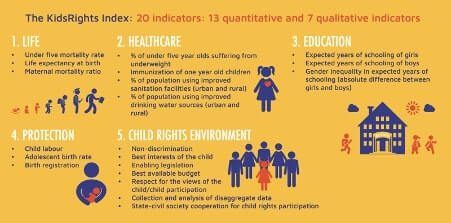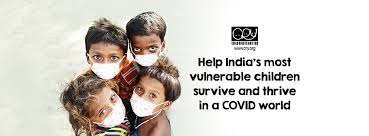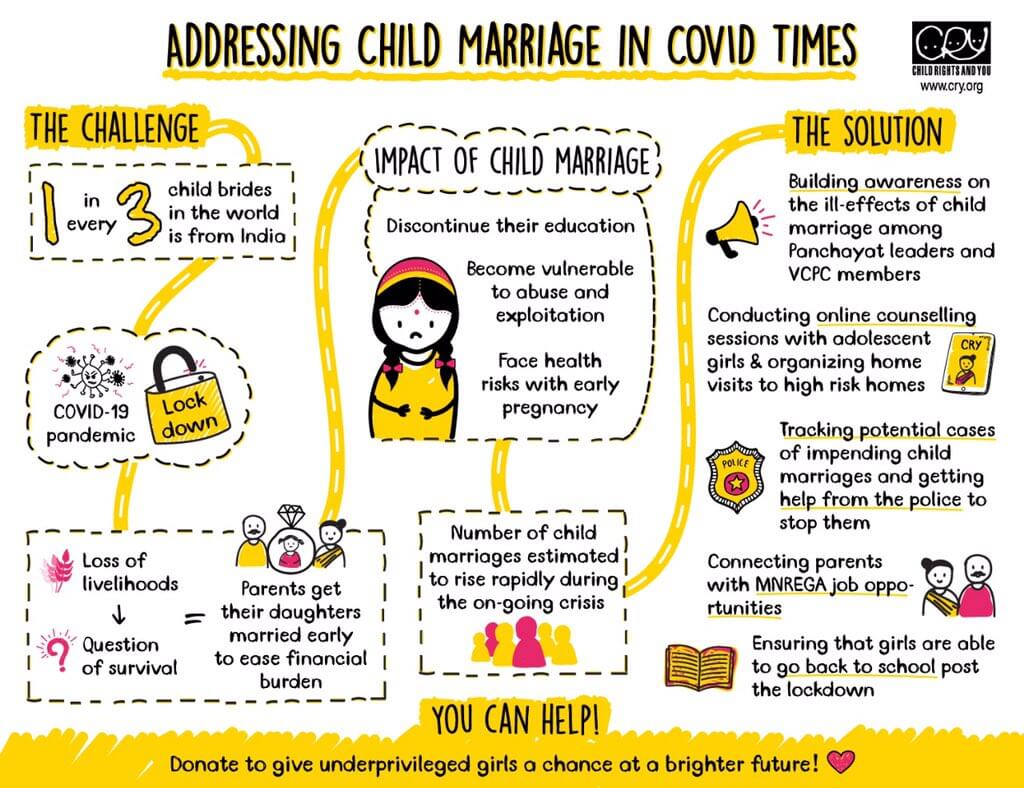Reading Time: 8 minutes
To discuss some of the critical policy issues and practical challenges relating to public provisioning of education for the children within 3 to 18 years during and beyond the pandemic, CRY – Child Rights and You and Centre for Budget and Governance Accountability (CBGA) organised a Webinar that brought together academicians, policy experts, civil society leaders and child rights defenders. A report for Different Truths.
With the nationwide lockdown gradually easing off but schools yet to open, the impact of the Covid-19 pandemic looms large on children’s education. As per recent data, closure of schools has affected a whopping 320 million students in India (UNESCO, 2020). At the same time, according to global estimates, no less than 24 million children – amongst whom 5.95 million are from South and West Asia – are at risk of not returning to school next year (UN, 2020), stated a media release from CRY.
As per recent data, closure of schools has affected a whopping 320 million students in India (UNESCO, 2020). At the same time, according to global estimates, no less than 24 million children – amongst whom 5.95 million are from South and West Asia – are at risk of not returning to school next year (UN, 2020), stated a media release from CRY.
Over the last six months, the pandemic has brought to fore some of the pre-existing gaps in public provisioning of education in India. The shift from classroom-based teaching to digital teaching has left out many children, who do not have access to the infrastructure required for participating in online education. There are also apprehensions that many of the children, who have been excluded from school education during the pandemic may not be able to return to schools again; and, even if they do, a large number of children would not find a level playing field anymore.
To discuss some of the critical policy issues and practical challenges relating to public provisioning of education for the children within 3 to 18 years during and beyond the pandemic, CRY – Child Rights and You and Centre for Budget and Governance Accountability (CBGA) organised a Webinar that brought together academicians, policy experts, civil society leaders and child rights defenders.
Underscoring the need to look into the public provisioning framework for children’s education, Priti Mahara, Director, Policy, Research and Advocacy at CRY said, “Humanitarian crises tend to hit the most vulnerable children the hardest, and COVID-19 is no exception. It is evident how it has impacted school education, created a digital divide, limited access to social welfare, and compromised health and nutrition schemes provided through schools….”

Underscoring the need to look into the public provisioning framework for children’s education, Priti Mahara, Director, Policy, Research and Advocacy at CRY said, “Humanitarian crises tend to hit the most vulnerable children the hardest, and COVID-19 is no exception. It is evident how it has impacted school education, created a digital divide, limited access to social welfare, and compromised health and nutrition schemes provided through schools. To address the ‘new normal’ in the education sector and to universalise education, adequate public provisioning will play a very crucial role.”
“It should be considered that children’s education, especially secondary education, had been traditionally under-prioritised and suffered further set back during the pandemic. Since the provisioning gaps are clear now more than ever, concerted efforts must be made to plug them at the earliest and ‘build back better’,” Priti added.
Reflecting on the need for a transformational increase in public provisioning for child education, Protiva Kundu, Additional Coordinator, Research at CBGA said, “Chronic under-allocation in school education has made the system fragile. A mere re-prioritisation of the existing quantum of budgets for school education would certainly not help. The overall direction of allocations should not only be limited to addressing issues arising from the pandemic but should go beyond…”
Reflecting on the need for a transformational increase in public provisioning for child education, Protiva Kundu, Additional Coordinator, Research at CBGA said, “Chronic under-allocation in school education has made the system fragile. A mere re-prioritisation of the existing quantum of budgets for school education would certainly not help. The overall direction of allocations should not only be limited to addressing issues arising from the pandemic but should go beyond. The sector demands additional resources across the various areas of provisioning in a manner that addresses the requirements more comprehensively.”
Venita Kaul, Director, CECED, Ambedkar University appreciated the New Education Policy (NEP) for the attention it pays to Early Childhood Care and Education (ECCE). She said, “The Ministry of Education takes on more responsibility for pre-school education which is indeed a positive step. However, while imparting Early Childhood Education, it is important to remember that it is not about formalising Early Childhood Education, but non-formalising primary education, while imparting education.”
“COVID has potentially changed the parent-school relationship. Technology is entering the education space rapidly and can be a useful tool to support parents, but imparting online education to younger children will be detrimental to them in the long run,” Venita added.
Kiran Bhatty, Senior Fellow, Centre for Policy Research highlighted, “While the NEP talks about universal access to education, it seems to have reposed little faith in the public education system. It also fails to consolidate learning derived from the public education system with little attention on strengthening public accountability and other existing gaps.”

Kiran Bhatty, Senior Fellow, Centre for Policy Research highlighted, “While the NEP talks about universal access to education, it seems to have reposed little faith in the public education system. It also fails to consolidate learning derived from the public education system with little attention on strengthening public accountability and other existing gaps.”
Sharing experiences from the field, Rajesh Kumar, CEO, Lokmitra, UP said, “COVID lockdown proved to be especially tough for the girl children who were pulled more and more into household chores. Though school closures gave rural boys some opportunities to explore their environment, they also suffered in terms of learning.”
According to him, “In such a scenario, School Management Committees (SMCs) could have been provided with more proactive roles and responsibilities.”
“The insights and suggestions emerging from the discussion will be collated and shared with the Union and State Governments with reference to the processes of revision of budget allocations for the current fiscal year (2020-21) and preparation of fresh budget estimates for the fiscal year 2021-22, which will be underway very soon,” said Priti Mahara, Director, Policy Research and Advocacy at CRY.
“The insights and suggestions emerging from the discussion will be collated and shared with the Union and State Governments with reference to the processes of revision of budget allocations for the current fiscal year (2020-21) and preparation of fresh budget estimates for the fiscal year 2021-22, which will be underway very soon,” said Priti Mahara, Director, Policy Research and Advocacy at CRY.
The discussion highlighted the key gaps, existing resources and policy needs for strengthening education for children during Covid-19 and beyond. Here are a few of them.
Increase in out-of-school children during and post-Covid -19 period: Widespread unemployment and income loss due to the pandemic will hinder households’ ability to pay to keep students in schools. This impact will be larger for poorer households who might face budget constraints, pushing children to drop out of school and be pulled into economic activities to support their parents in earning.
Widespread unemployment and income loss due to the pandemic will hinder households’ ability to pay to keep students in schools. This impact will be larger for poorer households who might face budget constraints, pushing children to drop out of school and be pulled into economic activities to support their parents in earning.
Providing scholarships, allocating more resources for survey in identifying out of school children by the government, budgetary interventions to mainstream out of school children of 15-18 years age group under SMSA, ensuring free public provisioning of Secondary education (for IX-XII standard) and extending the RTE Act to cover 15-18 years age group children by the government are likely to go a long way in undoing the adverse effects of the pandemic on children’s education.
Disruption in school meal services affecting the nutrition of 6-17 years children: As the schools closed across the country, the school feeding programme could no longer provide the much-needed free lunch to 115.9 million children who are enrolled under the scheme (MDM Portal).
To cater to the hunger of millions of children who depend on MDM as their source of only and nutrition, the government needs to devise newer ways of delivering meals till schools are closed. Also, MDM coverage including the breakfast scheme needs to extend to the secondary level, which clearly highlights the need for a significant increase in the MDM budget in the current and forthcoming financial years by the government.
Online education reinforces the digital divide and learning inequality: Due to the closure of schools to ensure the safety of children, teaching has moved to digital platforms. However, remote learning comes with a set of challenges including access to basic digital infrastructure and exposing children to multiple cyber-related crimes like explicit or violent content, hacking and cyberbullying.
Due to the closure of schools to ensure the safety of children, teaching has moved to digital platforms. However, remote learning comes with a set of challenges including access to basic digital infrastructure and exposing children to multiple cyber-related crimes like explicit or violent content, hacking and cyberbullying.
To ensure no children are left behind in education, the government should distribute textbooks, free smartphones/laptops/tabs to all school children. Also, states should provide free data package or reimburse the cost of data, which would also require substantial investment to strengthen digital infrastructure including the regular supply of electricity to all households, and a clear roadmap with timelines needs to be developed to ensure inclusive digital infrastructure are some of the key measures required for delivering online classes to the last mile child.
Children lose out on early childhood care and education (ECCE): Pre-schools play a crucial role in laying the foundation of a proper psychological, physical and social development of a child. The closure of schools and other institutions that provide early childhood care and education continues to pose an immense threat to their holistic development potential.
Hence, until AWCs reopen, systems need to be developed for ensuring delivery of early childhood education, doorstep delivery of supplementary nutrition in the form of cooked food or take-home ration for young children, the government should adequately invest on Pre-school component of ICDS, prioritise the training of AWW for providing pre-school education, and ensure free provisioning of quality ECCE services to all children.

Hence, until AWCs reopen, systems need to be developed for ensuring delivery of early childhood education, doorstep delivery of supplementary nutrition in the form of cooked food or take-home ration for young children, the government should adequately invest on Pre-school component of ICDS, prioritise the training of AWW for providing pre-school education, and ensure free provisioning of quality ECCE services to all children.
Disproportionate impacts of school closures on marginalised children:Even though remote learning strategies aim to ensure continued learning for all children, it is well known that the most marginalised children may not be able to access these opportunities.
Measures like making an upward revision of scholarship amount for marginalised children, developing inclusive learning solutions especially for the most vulnerable and marginalized sections of the society, substantial resource allocation from both Union and state governments, recruiting special educators, adhering to the Rights of Persons with Disabilities Act, 2016 to meet the needs of different types of students with disabilities, and an overall focus on equity and inclusion in policy-making and investment would help in building back systemic resilience.
Amid the range of recommendations, it is crucial for the Union and State Governments to provide enough financial support for ensuring equitable and effective access to education for children. Also, the prolonged economic crisis in the country and the serious challenges in revenue mobilisation and Centre-State resource sharing indicate the possibility of substantial ‘budget cuts’ for a range of sectors due to.
Amid the range of recommendations, it is crucial for the Union and State Governments to provide enough fiscal support for ensuring equitable and effective access to education for children. Also, the prolonged economic crisis in the country and the serious challenges in revenue mobilisation and Centre-State resource sharing indicate the possibility of substantial ‘budget cuts’ for a range of sectors due to. Hence, it is imperative to significantly focus on protecting the already insufficient budgets allocated for provisioning of education to children along with safeguarding the budget support promised for health and other social sectors.
Photo from the Internet














